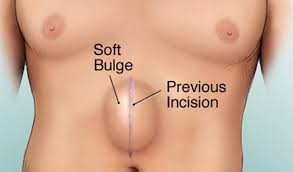
Hernia -
A hernia occurs when an organ pushes through an opening in the muscle or tissue that holds it in place. For example, the intestines may break through a weakened area in the abdominal wall.
Hernias are most common in the abdomen, but they can also appear in the upper thigh, belly button, and groin areas. Most hernias aren’t immediately life-threatening, but they don’t go away on their own. Sometimes they can require surgery to prevent potentially dangerous complications.
Symptoms -
The most common symptom of a hernia is a bulge or lump in the affected area. In the case of an inguinal hernia, you may notice a lump on either side of your pubic bone where your groin and thigh meet.
You’re more likely to feel your hernia through touch when you’re standing up, bending down, or coughing.
If your baby has a hernia, you may only be able to feel the bulge when their crying. A bulge is typically the only symptom of an umbilical hernia.
Other common symptoms of an inguinal hernia include:
pain or discomfort in the affected area (usually the lower abdomen), especially when bending over, coughing, or lifting
weakness, pressure, or a feeling of heaviness in the abdomen
a burning, gurgling, or aching sensation at the site of the bulge
Other symptoms of a hiatal hernia include:
acid reflux, which is when stomach acid moves backward into the esophagus causing a burning sensation
chest pain
difficulty swallowing
In some cases, hernias have no symptoms. You may not know you have a hernia unless it shows up during a routine physical or a medical exam for an unrelated problem.
Causes -
Hernias are caused by a combination of muscle weakness and strain. Depending on its cause, a hernia can develop quickly or over a long period of time.
Common causes of muscle weakness include:
failure of the abdominal wall to close properly in the womb, which is a congenital defect
age
chronic coughing
damage from injury or surgery
Factors that strain your body and may cause a hernia, especially if your muscles are weak, include:
being pregnant, which puts pressure on your abdomen
being constipated, which causes you to strain when having a bowel movement
lifting heavy weight
fluid in the abdomen, or ascites
suddenly gaining weight
surgery in the area
persistent coughing or sneezing
Risk -
The factors that increase your risk of developing a hernia include:
a personal or family history of hernias
being overweight or obese
a chronic cough
chronic constipation
smoking, which can trigger a chronic cough
Conditions such as cystic fibrosis can also indirectly increase your risk of developing a hernia. Cystic fibrosis impairs the function of the lungs, causing a chronic cough.


